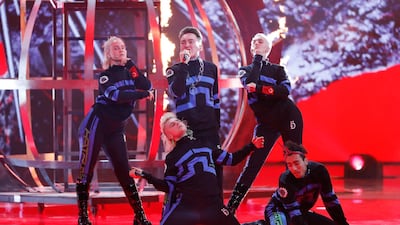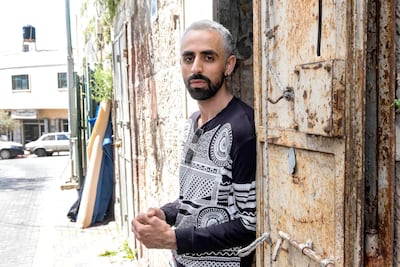After worrying Eurovision organisers and thrilling an unexpected international audience in May, Icelandic industrial rockers Hatari return with their politically charged new single. The recently released Klefi / Samed finds the band picking up where they left off after their controversial and fiery performance at this year's song contest in Tel Aviv.
A collaboration with Bashar Murad, the track is sung in Icelandic and Arabic, and features Hatari's pummelling brand of industrial rock tempered by the soulful vocals of the Palestinian singer.
With the haunting Arabic refrain of "I am steadfast and won't bow down, after all this torture", the song serves as a rallying cry against the Israeli occupation of Palestine and comes with a powerful video shot in the Jericho desert.
Recorded the day after the Eurovision ceremony, it capped off a turbulent trip for Hatari, which ended with the group on the verge of expulsion for using the event’s promotional duties to express their support for Palestinian rights.
Speaking to The National a day after a heroic performance at Iceland's Secret Solstice Festival, singer Matthias Haraldsson recalled how crisis discussions were held with Hatari and the Eurovision organisers.
“When we said what we saw in Israel was clearly apartheid, we were called in for a meeting with the CEO of the contest. He told us we crossed a line and that we were too political,” he says. “We found it a paradox that they were holding what they say is a non-political song contest in Israel. The way we saw it was they broke their own rules the day they decided to host the event there.”
The show went on regardless and Hatari's abrasive techno-metal of Hatrio Mun Sigra (Hatred will prevail) came 17th place out of 26. The band doubled down on their position further in the live ceremony by raising the Palestinian flag during the announcement of their results. The footage, however, has been omitted from the official DVD of the contest.
Haraldsson is not too bothered. As far as he’s concerned, the band made their point. He explains the support for the Palestinian cause is part of the group’s overall message, which is one of warning against militarism and corporate greed.
“We do speak in broad terms about society and about living within the system and opposing it at the same time,” he says. “However, when it came to Israel and Palestine, a very clear stand was demanded from us. We gave away that privilege to speak ambivalently and instead made our views very clear on the issue.”
Keen to address the lack of Palestinian voices in the Eurovision ceremony, the band decided to collaborate on a song with a native artist.
After reaching out to organisers of the annual Palestinian Music Expo, it was recommended they collaborate with Murad. A burgeoning talent who lives in Jerusalem, he is the son of esteemed musician Said Murad, founder of the legendary Palestinian music ensemble, Sabreen.
Over the past three years, he has steadily built an international following. His strong selection of indie-Arabic songs tackle issues within Palestinian society, such as gender roles and equality (Everyone's Getting Married and I'm a Man).
Murad says Klefi / Samed was born out of a series of Skype conversations with the band that began in March. Those exchanges of life experiences dictated the lyrical direction of the song.
One thing Murad was adamant about from the outset, he says, is that he wanted the music to have a purpose. "I knew how big the Eurovision platform is and I knew how much attention Hatari had on them because of their controversial aesthetics and themes. So I didn't want to waste this opportunity I had with them. They were coming to Israel as a protest group and with this collaboration, I wanted to step this up even further."
Murad approached the subject matter of the Palestinian cause from a different perspective. In his component of the track, he explores the concept of “Samad”, an Arabic term for steadfastness. It is a value, he says, that is ingrained into the Palestinian psyche. “It is the idea that we have lived here and I was born here, so no one can take that connection that we have to this place,” he says.
"You can come and tell me about years and decades of history, but that is irrelevant to me because I am from here. It doesn't make sense to me that someone can come from, I don't know where, and have more privileges than someone who is native to this place. All of these emotions sparked the lyrics, where I am basically saying that I am here and I am not going anywhere."
Where Murad’s emotive turn aims to stir the heart, Hatari’s lyricism focuses on the slow mental disintegration that resignation brings. In Haraldsson’s distorted growl, he paints a foreboding picture of an “empty chamber, echoing impotence, glassy, only begotten doubt”. It is that struggle between hope and hopelessness that provides the song’s emotional heft, which is further cemented in the eye-catching video. Co-directed by Murad and Hatari, the song is full of majestic images of the rugged Jericho desert.
True to the spirit of the lyrics, Murad’s section of the video has him strolling intently alone through the desert heat. These visuals are frequently juxtaposed with Haraldsson’s scenes, in which he sings in front of an empty black background.
Intriguingly, despite all they had been through creatively in the process of writing and recording the song, it was on the day of the shoot that both artists met. Haraldsson recalls the experience as surreal. “It was an absurd contrast for us, because the day before we were working in this well-oiled and financed pop machine that is Eurovision, and the next day we were with a small crew and doing things ourselves,” he says.
“It was there that we met Bashar and that was amazing. We immediately clicked and we felt pretty much at home. We were both fuelled by ambition to finish the project.”
Despite the band’s turbulent experience in the competition, Haraldsson confirms the “Eurovision effect” is real. Hatari has amassed an international fan base. They are in the studio working on a debut album, and have also announced a 20-date European tour to kick off next January.
As for Murad, the track’s wide exposure is not only a personal milestone, but also one for the thriving Palestinian music scene. “That song got over a million views on YouTube and that’s the first time that has happened to me,” he says.
“It is really special to be a Palestinian artist right now, because there are so many great acts that are coming up here. There is a collective effort going on here, so this success gives us all a push. Success for me means success for all Palestinian musicians because it is definitely putting us on the radar.”



